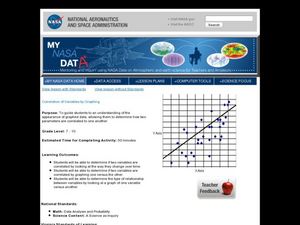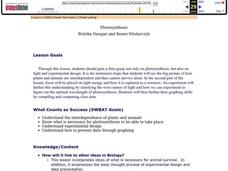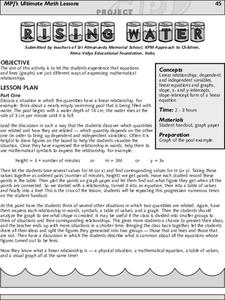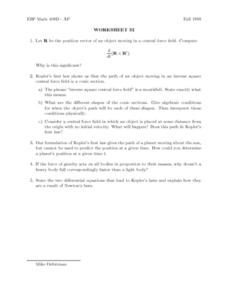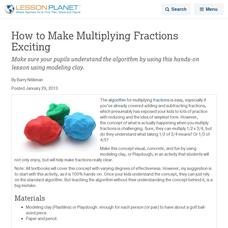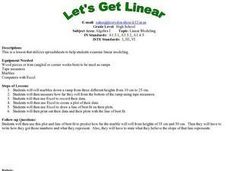Curated OER
What Time is it?
Here is a nice presentation on time; how to read analog clocks and calculating elapsed time. The graphics, and problems posed in this PowerPoint are especially good. One nice feature is that students are encouraged to work together in...
Curated OER
Correlation of Variables by Graphing
Middle and high schoolers use a spreadsheet to graph data. In this graphing lesson plan, learners determine how two parameters are correlated. They create a scatter plot graph using a computer spreadsheet.
Curated OER
Egyptian Counting
Ancient Egyptian's had a fantastic number system and your class gets to use it to practice basic math skills! They are presented with several examples of Egyptian numbers which they use to complete several addition and subtraction...
Curated OER
Purchasing Items Using the Next Dollar Strategy
Drill and practice is the method of teaching for today. Special needs pupils practice rounding to the next dollar value when purchasing an item at the store. They are shown flash cards with a monetary value, they then have 3-5 seconds to...
Curated OER
Creating a Three sisters Garden
Students understand that a three sisters garden is comprised of corn, beans and squash. In this three sisters garden lesson, students understand that Native Americans planted three sisters gardens and grow a three sisters garden....
Curated OER
Lesson 6: Mittens, Socks, Mittens, Socks, Mittens!
Mittens and socks, two of my favorite clothing items! Young learners with special needs, explore clothing appropriate for cold weather. They identify both socks and mittens, discuss weather appropriate clothing, and listen to the story,...
Curated OER
Miras, Mirrors, and Kaleidoscopes!
Learners use hands-on activities to explore transformations. They view a video segment that demonstrate how M. C. Escher employed geometry and transformations to create so many of his famous drawings.
Curated OER
Photosynthesis
Students recognize the importance of plants as they perform an experiment involving photosynthesis. Students determine the optimum wavelength of light for photosynthesis by exposing plants to different colors of light, collecting data,...
Sri Atmananda Memorial School
Rising Water
An engaging, and not to mention attractive, lesson plan has prealgebra and beginning algebra scholars examining linear relationships. They consider the rising water level as a swimming pool is being filled. They do so by charting and...
Curated OER
Fish and Clips
Youngsters test magnetic strength by measuring the mass of paper clips that they "hook" with a magnet. Your first and second graders should love the hands-on activities associated with this plan. The reproducible materials are quite good...
Curated OER
Brain Train
A lengthy presentation on geometric reflections is here for your young geometers. Learners consider a shape, then must choose between four reflections to find the one that is a true vertical, horizontal, or diagonal reflection of the...
Curated OER
Worksheet 32: Kepler's Law
In this math worksheet, students are given 8 questions regarding Kepler's first law of motion. The questions include definitions, short essay explanations, and formulaic expressions.
Curated OER
Worksheet 19: Ship Positions
In this math worksheet, learners read informational paragraphs and then answer 18 questions using data from their readings. Questions are about vectors, positions, distance and orbits.
Curated OER
Buying New Stuff
Young spenders take a look at the best ways to save and spend money. This type of financial education is lacking in schools, so implementing this lesson would be of great value to your students. Things like bank checking account fees,...
Curated OER
How to Make Multiplying Fractions Exciting
Make sure your pupils understand the algorithm by using this hands-on lesson using modeling clay.
DK Publishing
The Missing Numbers
Where are all the numbers? Scholars practice with number sequences in different formats as they fill in numerals. First, an analog clock face is missing four numbers. Next, they write in the next four digits in a single-digit sequence....
Curated OER
Working With Basic Units of Time
In this math worksheet, students investigate telling time, elapsed time and word problems pertaining to time. Students also convert minutes to hours and hours to days. There are 40 problems on the 3 pages.
Curated OER
Calculating Simple Interest
In this math worksheet, students investigate the concept of paying interest on a loan. Students read 10 problems where they look at a picture of something they are going to buy at a certain price and interest rate. Students calculate the...
Curated OER
Family Profile Record Sheet
In this math instructional activity, students learn real world math applications for budgeting expenses in a simulated family. Kids make a family profile with profession choice and monthly income. Students then fill out detailed budgets...
Curated OER
Renting an Apartment-- Math Word Problems
In this math worksheet, students analyze real-world situations involving math. Students read about a woman and her monthly budget for an apartment rental. Students calculate the answers to 6 problems about the rent and solve 10 problems...
Curated OER
Cylinder: Student Worksheet
Pairs of geometry whizzes work together to determine which of three differently shaped cylinders will have the greatest volume. Pupils cut out the three rectangles embedded in the plan, and tape them together to form a cylinder. From...
Curated OER
Let's Get Linear
Math whizzes utilize spreadsheets to examine linear modeling. They roll marbles down a ramp from three different heights and measure how far they roll. They use Excel to record their data and create a plot of their data.
Curated OER
da Vinci: Body Proportion Theories
Middle schoolers investigate the validity of da Vinci's proportion theory by recording human measurements on scatter plots. In groups of three, they record each other's height and wingspan to create a Powerpoint presentation, chart, or...
Curated OER
Likely Outcomes
A coin toss is a simple and fun way to help youngsters discovery probability. Preferably in partners, they first predict what would happen if they tossed two coins 48 times. How often would two heads show up? Two tails? How about one of...



